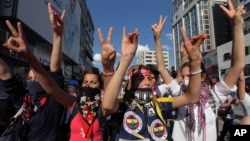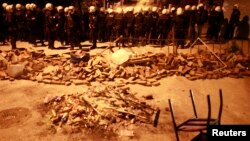ISTANBUL —
Thousands of Turkish anti-government protesters marched again Tuesday, even after the deputy prime minister said the government has "learned its lesson."
Demonstrators filled central Ankara and the main square in Istanbul as night fell Tuesday, defying government appeals to end their protests.
Deputy Prime Minister Bulent Arinc said it was wrong to use "excessive force" against the marchers. But he refused to apologize to those who he says have destroyed property and interfered with people's freedom.
He said he was apologizing to the environmentally-minded protesters injured by police during a demonstration against government plans to demolish Gezi Park, adjacent to Istanbul's Taksim Square.
The nationwide unrest was sparked last Friday after police violently evicted demonstrators who were peacefully protesting against the planned redevelopment of one of the few parks in central Istanbul. The deputy prime minister also said he was prepared to meet with protestors.
He said he would find an opportunity to meet the youngsters who held the initial protest.
The first reactions from demonstrators on Twitter and other social media have generally been skeptical. Many criticize the deputy prime minister for only condemning the police’s initial response to the protests and not the ongoing crackdown.
There were clashes in both Istanbul and the capital Ankara Monday night, with police using tear gas, water cannon and, according to some reports, plastic bullets. A 22-year-old protestor was shot dead in the southern city of Antakya near the Syrian border.
Many protestors are calling on Prime Minister Recep Tayyip Erdogan to apologize. Much of the protesters' anger of the protests is direct against Erdogan, whom they accuse of acting in an increasingly authoritarian way. On Monday, during a visit to Morocco, the Turkish prime minister repeated his tough stance against the protestors, calling them "marginal" and claiming calm was returning to the country.
But pressure on the government continues to grow, with members of Turkey’s 240,000-strong public sector workers union launching a two-day nationwide strike Tuesday.
The leftist union is a strong critic of the government. Earlier this year, police raided its national offices, and dozens of its officials are on trial under the country’s anti-terrorism law.
Observers warn the growing unrest has started to unnerve financial markets, and Turkey's stock market plunged on Monday. With no signs that the protesters are ready to quit, that nervousness could well continue.
Demonstrators filled central Ankara and the main square in Istanbul as night fell Tuesday, defying government appeals to end their protests.
Deputy Prime Minister Bulent Arinc said it was wrong to use "excessive force" against the marchers. But he refused to apologize to those who he says have destroyed property and interfered with people's freedom.
He said he was apologizing to the environmentally-minded protesters injured by police during a demonstration against government plans to demolish Gezi Park, adjacent to Istanbul's Taksim Square.
The nationwide unrest was sparked last Friday after police violently evicted demonstrators who were peacefully protesting against the planned redevelopment of one of the few parks in central Istanbul. The deputy prime minister also said he was prepared to meet with protestors.
He said he would find an opportunity to meet the youngsters who held the initial protest.
The first reactions from demonstrators on Twitter and other social media have generally been skeptical. Many criticize the deputy prime minister for only condemning the police’s initial response to the protests and not the ongoing crackdown.
There were clashes in both Istanbul and the capital Ankara Monday night, with police using tear gas, water cannon and, according to some reports, plastic bullets. A 22-year-old protestor was shot dead in the southern city of Antakya near the Syrian border.
Many protestors are calling on Prime Minister Recep Tayyip Erdogan to apologize. Much of the protesters' anger of the protests is direct against Erdogan, whom they accuse of acting in an increasingly authoritarian way. On Monday, during a visit to Morocco, the Turkish prime minister repeated his tough stance against the protestors, calling them "marginal" and claiming calm was returning to the country.
But pressure on the government continues to grow, with members of Turkey’s 240,000-strong public sector workers union launching a two-day nationwide strike Tuesday.
The leftist union is a strong critic of the government. Earlier this year, police raided its national offices, and dozens of its officials are on trial under the country’s anti-terrorism law.
Observers warn the growing unrest has started to unnerve financial markets, and Turkey's stock market plunged on Monday. With no signs that the protesters are ready to quit, that nervousness could well continue.





